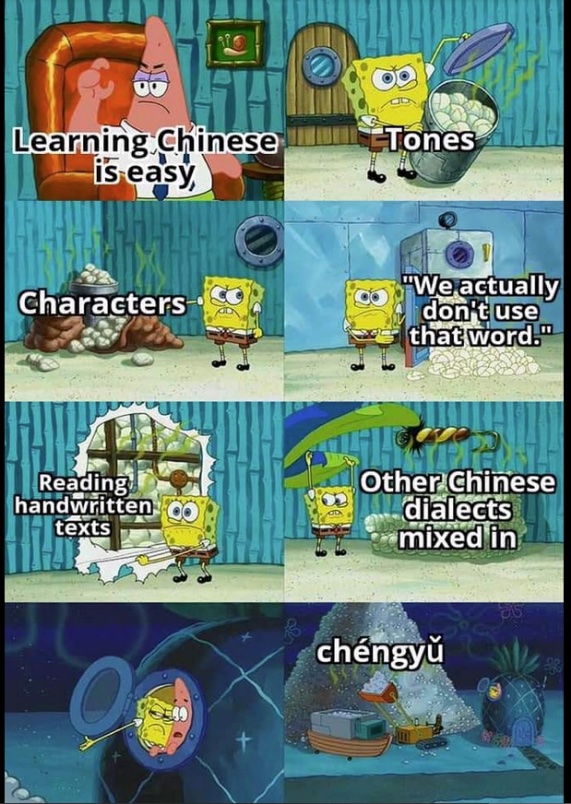Learning Chinese is easy — not
« previous post | next post »
From the Facebook page of a friend:
The only term that might need explanation is chéngyǔ 成語 ("set phrases"), misleadingly usually referred to as "idioms", for which see here, here, and in the bibliography below. In truth, they are not much used nowadays, although many Western learners mistakenly invest a lot of time and energy in memorizing them. Actively knowing a dozen or two of them should suffice; passively recognizing two or three dozen should be plenty.
Also, those "dialects", i.e., "topolects", that get mixed in are often completely separate Sinitic languages with distinct grammars, lexicons, etc.
P.S.: I love the little snail in the first panel of the "Spongebob Squarepants" meme template.
Selected readings
- "'The old man at the pass loses his horse'" (5/2/20)
- "Eighty-one Cantonese proverbs in one picture" (2/27/14)
- "Too tired to love: new set phrases in Pinyin" (12/23/19)
- "Chinese proverbs" (1/19/16)
- "More literary troubles for Xi Jinping" (1/3/19) — see especially this comment for the sharply diminished usage of set phrases in contemporary speech and writing
- "A [class.] zoo" (1/18/15)
- "Mistakes in English and in Chinese" (2/13/18)
- "How to learn to read and write Chinese" (8/13/19)
- "Excessive quadrisyllabicism" (2/17/18) — I was reminded of this post by this tweet from the author of the following famous article
- "Why Chinese Is So Damn Hard" (8/27/91)
- "Sinitic topolects" (9/2/20)
- "The Sinophone" (2/28/19)
- "Sinitic languages without the Sinographic script" (3/5/19)
- "Writing Sinitic languages with phonetic scripts" (5/20/16)
- "Dialect or Topolect?" (7/1/10)
- "The American Heritage Dictionary of the English Language, 5th edition" (11/14/12)
- "'Chinese' well beyond Mandarin" (5/10/13)
[Thanks to June Teufel Dreyer]

Jenny Chu said,
July 20, 2022 @ 9:18 pm
My teenage children, educated in the Hong Kong local system, agree entirely with this meme. However, they disagree that knowing a just dozen 成語 would suffice for daily use – they feel as if they are constantly having to explain them to me when they (various 成語) appear in the wild!
Jonathan Smith said,
July 21, 2022 @ 7:35 pm
Agree with the post in spirit that "chengyu" (a somewhat amorphous category) too often give off stale/pedantic/corporate/pretentious.. vibes — and are of pretty marginal utility in day-to-day interactions :D
That said, yeah, one will of course encounter several thousand over the course of a few months of just, say, listening to the nightly news and/or reading novels. (The Li Weijiao et. al. collection has some stats.) Something for learners to whom such activities appeal to keep in mind…
Guy said,
July 22, 2022 @ 2:01 pm
The snail’s name is Gary!
T said,
July 23, 2022 @ 2:09 pm
I wonder if the general tolerance to code-mixing (Literary Chinese, Mandarin, Cantonese), both written and spoken (Cantonese), in Hong Kong makes the daily use of chengyu more natural and less pretentious. You can surely get by not using chengyu actively. But I would agree with Jenny that you probably need to know passively quite a bit more. Plus chengyu are just fun to learn, aren't they?